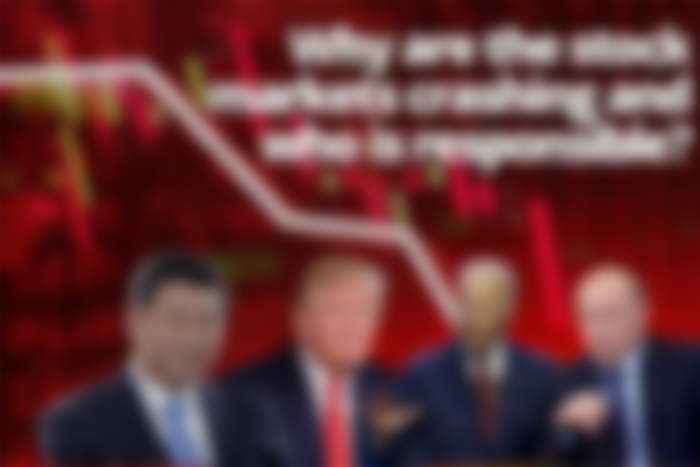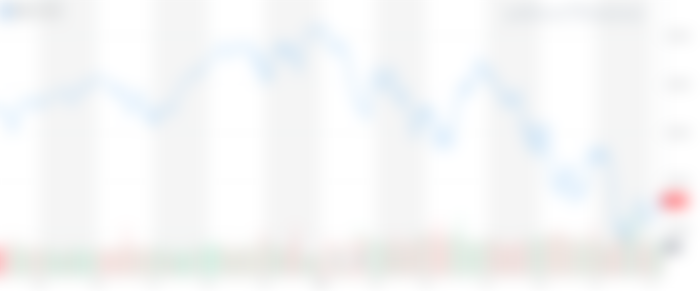Why are the stock markets crashing and who is responsible?

If you're invested in the stock market, if you fancy yourself as a day trader or maybe just an index funder, then maybe stop reading this article, take a look at your portfolio, scream, take half an hour to compose yourself and then come back. For the rest of you, here's a recap of what's happened since the beginning of the year. Stock markets around the world have been declining, but the last few days have been especially brutal. I'm leaving some to blame all of their woes on us president Biden, but before you start peeling your I did that stickers, let's talk about what's actually going on with the economy, if Biden is ready to blame, and if your investments have any hope.
Okay, so before we start apportioning any blame, let's start by explaining what's actually happening at the moment. For a while now, the stock market has been in a state of flux. Having hit all-time highs back in January, the benchmark s&p500 has seen a precipitous decline throughout June. Falling 10% month to date and eventually reaching its lowest level since January 2021. Looking more broadly, the index has fallen more than 20% since its peak in January 2022, indicating that the S&500 has now officially entered bear market territory. The question is, however, how on earth did we get here? Well, to properly understand how we've gotten into this position, we need to take a step back first and explain inflation. But before you turn this page off, trust me, this will make explaining the stock market crash and everything that comes later much easier. Broadly speaking, inflation can be driven by demand, known as demand pull inflation, or by supply, known as cost push inflation. The US and the rest of the globe, in fact, are experiencing big cases of both, which, spoiler alert, is not the best news. So let's unpack what these two types of inflation are and why they're both kicking into high gear at the moment.

Let's start with the demand side of things. During COVID, many countries spent tons of money attempting to keep the economy alive and support jobs. For instance, during the height of the pandemic, the federal government gave out huge sums of money in the form of stimulus checks. The plan was that this money would be spent during the height of the pandemic to keep the economic juices flowing. In reality, though, people just save and save a lot. To be honest, that makes sense because, as more people were forced to work from home, they no longer needed to spend money on transportation, lunch out of the house, or drinks after work. Coupled with the closure of most leisure and food facilities, meant that people naturally cut back on spending at a time when the government was giving out more and more money, and so now that society is slowly returning to normal, that pent-up demand is filtering through, which is causing demand to pull inflation. And that's because when you have a fixed quantity of goods and a growing pool of cash looking to be spent, prices invariably rise, and that's exactly what's happened.
Depending on which camp you belong to, this is either evidence of the market at its best, rationing out goods to those who need them the most, or evidence of capitalism at its worst, with corporations simply hoarding their profits. In any case, in recent months we've seen increased demand and thus increased prices. And this situation is made even worse by the other kind of inflation, the one driven by supply. I just told you that the amount of money looking to be spent is rising and, as such, prices are too, but it's not quite that simple and the issue is being made worse by the fact that the number of products available to be bought is actually falling. A huge confluence of factors, from COVID-related shutdowns in China through to the war in Ukraine, has meant that goods aren't being produced at either the same pace or the same cost as they were before, which again inevitably pushes costs higher. For instance, as the price of oil has skyrocketed, so too has the price of petrol, diesel, and electricity more generally, all of which filter into higher prices. That cost pushes inflation in action. So, with that knowledge in place, you now hopefully understand why things are getting more expensive. Loads of extra money looking to be spent and a lack of supply have pushed up costs and driven inflation.

But this article isn't about inflation, it's about the stock market crash. So what's the link between the two? The simple answer is that everything in the economy is linked in one way or another. The more detailed answer relates to how investment decisions are made and, crucially, how central banks deal with inflation. That's because the standard economic response to inflation is to hike interest rates. If the economy is overheating and people are buying too much, you need to cool it down by making it more attractive to save by giving people a higher rate of interest on their savings accounts as well as making it more expensive to borrow. And that's all well and good. Interest rate hikes do limit spending, but they aren't exactly liked by markets for a whole host of reasons. They may call it the economy, but rate hikes also make it more expensive for businesses to service their loans. It knocks investor and consumer purchasing power and confidence, and maybe most importantly, it hurts relative returns.
Let me explain what that means. When interest rates are low, there's basically no reward for holding your cash in the bank. Why put your money in a savings account if you're only earning a tiny percentage of that money? So if you're looking to save and your bank isn't offering you a good interest rate, then any stock set to rise, even by a minuscule amount, might still be worth investing in. However, as interest rates rise, that calculation changes significantly. If your bank raises your interest rate, then you might suddenly want to save with them rather than risk it with stocks, and as such, some investors will pull money out of the stock market and put it back in the bank. When this starts to happen, the mass sell-off of stocks causes a glut in supply and causes prices to crash. It's potentially even causing a spiral to the bottom, and that's broadly what's happening at the moment. Inflation is damaging confidence in the market and encouraging people to move their money out of the market. These moves spark concerns among others and cause a bit of a spiral of money withdrawal.
Now, this is clearly all a bit of a simplification. This is only a short article, but if one of the main causes of this is inflation, then who's to blame for causing it? Well, it's not actually a very easy answer because there's a whole host of actors that could potentially, with the benefit of hindsight, be blamed. First and foremost, the elephant in the room needs to be addressed. Russia's unprovoked invasion of Ukraine has put immense pressure on energy prices and while it could be argued that it was obvious that Russia was going to invade and that things ought to have been done before the fact, that's not exactly fair on anyone. Only Putin knew when the invasion was going to begin, and reasonable precautions were taken. So if we want to look more domestically, then blame can be apportioned to one of two actors: the Federal Reserve and the presidency. By the presidency, we mean both Biden and Trump. When it comes to the former, though, most, if not all, central banks have a clear core mandate on price stability, i.e. it's their job to ensure that inflation doesn't get out of whack, so you could make the argument that the feds have failed to meet their core objective.

As inflation began to tick up, the chair of the fed, Jerome Powell, continued to insist that inflationary pressures would be transitory and that they would just go away once things got back to normal. In particular, given this transit review, they kept monetary policy loose, with interest rates in particular remaining low in an attempt to boost the economy. With the benefit of hindsight, that looks pretty stupid, but the key is with the benefit of hindsight. The central banks around the world, not just the US, faced and continue to face the near impossible task of balancing inflation and economic recovery, which is clearly important in a post-covid world. On the presidency side of things, both President Trump and President Biden have pumped trillions into the economy in the form of stimulus checks, and most economists agree that at least some of the inflation we're seeing at the moment comes down to the government's fiscal package. And that's a difficult thing to square because it ultimately becomes a political question whether we should blame either of these people for taking the actions they did, given that they were both, for better or worse, dealing with the aftermath of a pandemic. And economic and recovery clearly were a high priority, and it's something that the rest of the world is dealing with too. This isn't a strictly US phenomenon. Economies around the world are seeing inflation get out of hand, with many suffering even worse than the US, so while it's easy to look at your national leaders when apportioning blame, it's often a larger issue than you think.



